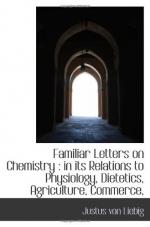Again, in investigating the composition of solid bodies,—of minerals,—we are under the necessity of bringing them into a liquid state, either by solution or fusion. Now vessels of glass, of porcelain, and of all non-metallic substances, are destroyed by the means we employ for that purpose,—are acted upon by many acids, by alkalies and the alkaline carbonates. Crucibles of gold and silver would melt at high temperatures. But we have a combination of all the qualities we can desire in Platinum. This metal was only first adapted to these uses about fifty years since. It is cheaper than gold, harder and more durable than silver, infusible at all temperatures of our furnaces, and is left intact by acids and alkaline carbonates. Platinum unites all the valuable properties of gold and of porcelain, resisting the action of heat, and of almost all chemical agents.
As no mineral analysis could be made perfectly without platinum vessels, had we not possessed this metal, the composition of minerals would have yet remained unknown; without cork and caoutchouc we should have required the costly aid of the mechanician at every step. Even without the latter of these adjuncts our instruments would have been far more costly and fragile. Possessing all these gifts of nature, we economise incalculably our time—to us more precious than money!
Such are our instruments. An equal improvement has been accomplished in our laboratory. This is no longer the damp, cold, fireproof vault of the metallurgist, nor the manufactory of the druggist, fitted up with stills and retorts. On the contrary, a light, warm, comfortable room, where beautifully constructed lamps supply the place of furnaces, and the pure and odourless flame of gas, or of spirits of wine, supersedes coal and other fuel, and gives us all the fire we need; where health is not invaded, nor the free exercise of thought impeded: there we pursue our inquiries, and interrogate Nature to reveal her secrets.
To these simple means must be added “The Balance,” and then we possess everything which is required for the most extensive researches.
The great distinction between the manner of proceeding in chemistry and natural philosophy is, that one weighs, the other measures. The natural philosopher has applied his measures to nature for many centuries, but only for fifty years have we attempted to advance our philosophy by weighing.




